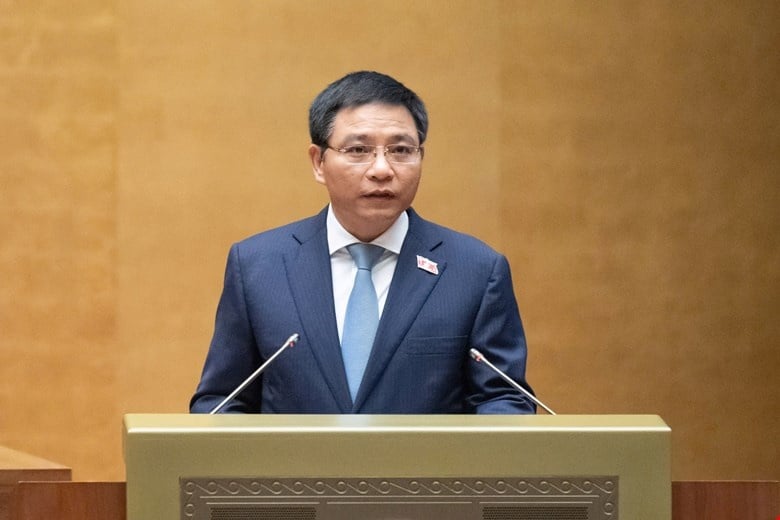 |
| Minister of Finance Nguyen Van Thang |
The draft law was reviewed to remove difficulties and obstacles in the implementation of Law No. 69/2014/QH13, ensuring its suitability with reality and compliance with the provisions of the Law on Promulgation of Legal Documents. The draft inherits the provisions that have been applied stably and are still suitable from Law 69, while amending and supplementing new contents to resolve shortcomings in the past, meeting the requirements of state capital management in the coming period.
A fundamental change in this draft law is that the State exercises its rights, obligations, and responsibilities corresponding to the proportion of capital ownership in the enterprise, equally with other investors, and does not directly intervene in the production and business activities of the enterprise. If the current Law 69 focuses on managing enterprises with State capital contributions, the revised draft law only manages the State capital participation in the enterprise. This answers the opinions of some delegates about whether the State needs to manage public assets or not. When the State contributes capital, that capital forms the assets of the enterprise, and the State exercises its rights through shares or capital contributions. Therefore, it is necessary to respect the independent legal entity of the enterprise, and not consider the enterprise's assets as public assets owned by the State.
Second, regarding enhancing autonomy, self-responsibility and accountability, the draft law stipulates that enterprises conduct production and business activities according to market mechanisms, equality, cooperation and competition according to the law. Specific issues are assigned to the Government for detailed regulations, ensuring flexibility, suitability with reality and social development. The draft promotes decentralization, delegation of authority, and reduction of administrative procedures, meeting the requirements of enterprise management and development.
Third, regarding the management of state capital invested in enterprises, the Minister said that for enterprises in which the State holds 100% of the charter capital, the draft law strongly decentralizes the responsibility for capital mobilization, preservation and development of state capital to the Board of Members and the Chairman of the Board of Directors of the company. They are entitled to issue 5-year business strategies, annual business plans, investment decisions, salary, remuneration and bonus policies. The draft adds regulations on lending capital to subsidiaries, handling after-tax profits for failed investment costs or costs of performing political tasks according to Government regulations, increasing the maximum deduction level for the Development Investment Fund, perfecting regulations on transfer of investment capital, leasing, leasing, hire-purchase, mortgaging, pledging assets, selling fixed assets, and transferring investment projects.
For enterprises in which the State holds more than 50% to less than 100% of charter capital, the draft decentralizes the State capital representative to decide on many contents according to authority, only reporting to the owner's representative agency before participating in voting at meetings of the general meeting of shareholders, the Board of Directors, or the Board of Members on important contents.
Fourthly, regarding supervision, inspection, examination and assessment of operational efficiency, many delegates were concerned that the draft did not specifically mention inspection and examination, fearing the risk of capital loss. The Minister said that, along with decentralization and autonomy, the draft adds provisions for the Government and the Prime Minister to direct, organize supervision, inspection and examination of contents on investment and management of state capital in enterprises. The Board of Members and the Chairman of the company are responsible to the Prime Minister and the representative agency of the owner, explaining related contents upon request. They are not allowed to continue to be representatives if they do not perform their duties properly, are assessed as not completing their duties, or show signs of irregularities affecting the legitimate interests of the enterprise.
The draft stipulates that the results of the assessment and classification of enterprises and representatives are the basis for considering the appointment, reappointment, dismissal, reward, or termination of contracts with members of the Board of Members, representatives, and controllers. These results are also the basis for setting up a reward and welfare fund and rewarding managers and employees according to regulations. In addition, enterprises must still comply with other laws, such as the Enterprise Law. In the near future, the amendment of the Enterprise Law will be synchronized with this draft to ensure that enterprises operate effectively and are strictly controlled. Inspection and auditing work will still be carried out according to current regulations, with a focus on post-inspection, enhancing autonomy but tightening accountability.
Regarding the transfer of investment projects, the Minister said that Law 69 has stipulated the transfer of capital in listed enterprises on the stock exchange by public auction, competitive offering, or agreement for unlisted enterprises. The draft law continues to inherit these provisions, which are specified in Article 24 and will be guided in detail in the decree. Regarding salaries, remuneration, and bonuses, the Drafting Committee has accepted the opinion to include these items in reasonable and valid expenses, stipulated in Article 24. Regarding sanctions for enterprises that disclose information late or not seriously, the draft has strictly stipulated in Articles 51 and 53, with detailed instructions in the decree.
Regarding the management of enterprises with less than 50% state capital and the role of the State Capital Management Committee at Enterprises (CMSC), the Minister said that for enterprises in which the State holds less than 50% of capital, the State's role is that of an investor seeking profit. The representative of the state capital monitors and evaluates efficiency, continues to contribute capital if the enterprise has development potential, or divests capital if it is ineffective. Many countries, such as Singapore with Temasek Group, have been successful in contributing capital to large enterprises, bringing significant profits. In Vietnam, if CMSC considers contributing capital to effective enterprises, it will help increase budget revenue. The role of CMSC and the Ministry of Finance is to support, supervise, and ensure the effective management of state capital in these enterprises.
Source: https://thoibaonganhang.vn/nha-nuoc-thuc-hien-quyen-nghia-vu-va-trach-nhiem-tuong-ung-voi-ty-le-so-huu-von-cong-tai-doanh-nghiep-164104.html




















































![[Maritime News] More than 80% of global container shipping capacity is in the hands of MSC and major shipping alliances](https://vphoto.vietnam.vn/thumb/402x226/vietnam/resource/IMAGE/2025/7/16/6b4d586c984b4cbf8c5680352b9eaeb0)













































Comment (0)